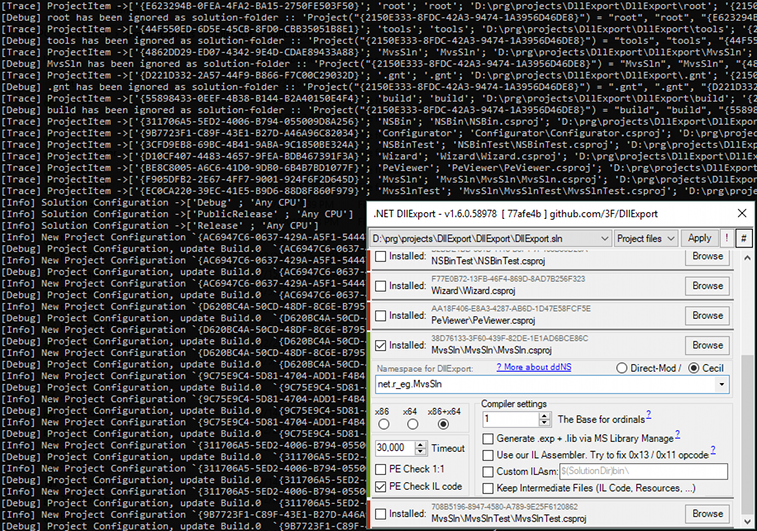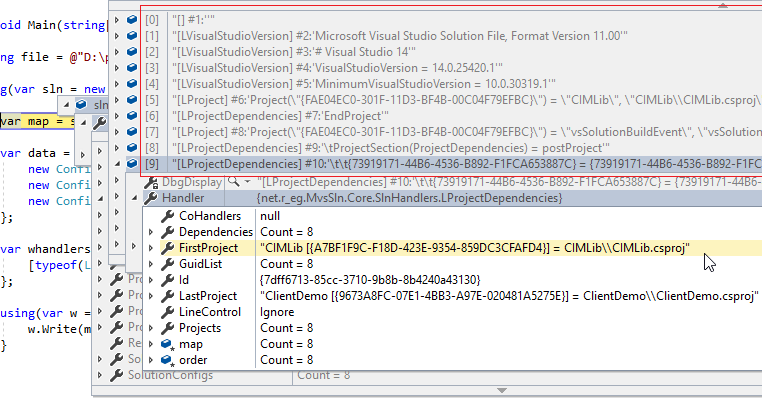🧩 Customizable VisualStudio .sln parser, Complex support of the projects (.vcxproj, .csproj., …), Pluginable lightweight r/w handlers at runtime, and more …
Download: /releases [ latest ]
gnt /p:ngpackages="MvsSln" [?]
Copyright (c) 2013-2020 Denis Kuzmin < x-3F@outlook.com > GitHub/3F
[ ☕ Donate ]
MvsSln contributors https://github.com/3F/MvsSln/graphs/contributors
We're waiting for your awesome contributions!
Because today it still is the most easy way for complex work with Visual Studio .sln files and their projects (.vcxproj, .csproj., ...). Because it's free, because it's open.
- 🌌 We're providing most convenient work with projects, their dependencies, their lazy loading, any folders, any items, references, and lot of other important things.
- 💡 We're customizable and extensible library at runtime. Make your custom .sln for everything!
- 🚀 We were born from other popular project to be more loyal for your preferences on the fly. Hello from 2013.
Even if you just need the basic access to information or more complex work through our readers and writers.
Easily control all your projects data (Reference, ProjectReference, Properties, Import sections, ...). Or even create your custom sln parsing of anything in a few steps.
Specially extracted and re-licensed from vsSolutionBuildEvent projects (LGPLv3 -> MIT) for https://github.com/3F/DllExport and others!
Enjoy with us. 🎈
using(var sln = new Sln(@"D:\projects\Conari\Conari.sln", SlnItems.All &~ SlnItems.ProjectDependencies))
{
//sln.Result.Env.XProjectByGuid(
// sln.Result.ProjectDependencies.FirstBy(BuildType.Rebuild).pGuid,
// new ConfigItem("Debug", "Any CPU")
//);
var p = slnEnv.GetOrLoadProject(
sln.ProjectItems.FirstOrDefault(p => p.name == name)
);
var paths = sln.Result.ProjectItems
.Select(p => new { p.pGuid, p.fullPath })
.ToDictionary(p => p.pGuid, p => p.fullPath);
// {[{27152FD4-7B94-4AF0-A7ED-BE7E7A196D57}, D:\projects\Conari\Conari\Conari.csproj]}
// {[{0AEEC49E-07A5-4A55-9673-9346C3A7BC03}, D:\projects\Conari\ConariTest\ConariTest.csproj]}
foreach(IXProject xp in sln.Result.Env.Projects)
{
xp.AddReference(typeof(JsonConverter).Assembly, true);
xp.AddReference("System.Core");
ProjectItem prj = ...
xp.AddProjectReference(prj);
xp.AddImport("../packages/DllExport.1.5.1/tools/net.r_eg.DllExport.targets", true);
xp.SetProperty("JsonConverter", "30ad4fe6b2a6aeed", "'$(Configuration)' == 'Debug'");
xp.SetProperties(new[] {
new PropertyItem("IsCrossTargetingBuild", "true"),
new PropertyItem("CSharpTargetsPath", "$(MSBToolsLocal)\\CrossTargeting.targets")
},
"!Exists('$(MSBuildToolsPath)\\Microsoft.CSharp.targets')"
);
// ...
}
sln.Result.ProjectConfigs.Where(c => c.Sln.Configuration == "Debug"); // project-cfgs by solution-cfgs
// ...
} // release all loaded projectsEasy to create/modify/or just use parsed folders, projects, and other.
Safely compare anything:
if(new ProjectItem(...) == new ProjectItem(...)) { ... }
if(new SolutionFolder(...) == new SolutionFolder(...)) { ... }
if(new RawText(...) == new RawText(...)) { ... }
if(new ConfigItem(...) == new ConfigItem(...)) { ... }
if((RawText)"data" == (RawText)"data") { ... }Use 📂 Subdirectories:
new SolutionFolder("dir1",
new SolutionFolder("dir2",
new SolutionFolder("dir3", "hMSBuild.bat", "DllExport.bat")
)
);
...
new SolutionFolder("{EE7DD6B7-56F4-478D-8745-3D204D915473}", "MyFolder2", dir1, ".gnt\\gnt.core");
...Projects and Folders:
new ProjectItem("Project1", ProjectType.Cs);
new ProjectItem("Project1", ProjectType.Cs, new SolutionFolder("dir1"));
new ProjectItem("Project2", ProjectType.Vc, "path 1");
new ProjectItem("{EE7DD6B7-56F4-478D-8745-3D204D915473}", "Project1", ProjectType.Cs, dir2);
...See related unit tests.
By the way, the any new solution handler (reader or writer) can be easily added by our flexible architecture. See below.
Control anything and have fun !
Let's consider examples of use in real projects below.
DllExport project finally changed distribution of the packages starting with v1.6 release. The final manager now fully works via MvsSln:
MvsSln is also a core logic in Post-Processing feature [?]
vsSolutionBuildEvent now is completely integrated with MvsSln [?]
Fully removed original parser and replaced related processing from Environment/IsolatedEnv/MSBuild/CIM. Now it just contains lightweight invoking of relevant methods.
https://github.com/3F/vsSolutionBuildEvent
v2+ now also may provide map of analyzed data. To enable this, define a bit 0x0080 for type of operations to parser.
Parser will expose map through list of ISection for each line. For example:
- Each section contains handler which processes this line + simple access via RawText if not.
- All this may be overloaded by any custom handlers (readers -
ISlnHandler) if it's required by your environment.
This map may be used for modification / define new .sln data through writers (IObjHandler). For example:
var data = new List<IConfPlatform>() {
new ConfigSln("Debug", "Any CPU"),
new ConfigSln("Release_net45", "x64"),
new ConfigSln("Release", "Any CPU"),
};
var whandlers = new Dictionary<Type, HandlerValue>() {
[typeof(LSolutionConfigurationPlatforms)] = new HandlerValue(new WSolutionConfigurationPlatforms(data)),
};
using(var w = new SlnWriter("<path_to>.sln", whandlers)) {
w.Write(map);
}// new collection from available projects but without project 'UnLib'
var projects = sln.Result.ProjectItems.Where(p => p.name != "UnLib");
// prepare write-handlers
var whandlers = new Dictionary<Type, HandlerValue>() {
[typeof(LProject)] = new HandlerValue(new WProject(projects, sln.Result.ProjectDependencies)),
};
// save result
using(var w = new SlnWriter(@"modified.sln", whandlers)) {
w.Write(sln.Result.Map);
}
// That's all. You should get 'modified.sln' without `UnLib` project.The 1 project instance means only the 1 project with specific configuration. That is, you should work with each instance separately if some project has 2 or more configurations:
First instance of project {4F8BB8CD-1116-4F07-9B8F-06D69FB8589B} with configuration 'Release_net45|Any CPU' that's related with solution cfg -> CI_Release_net45|Any CPU
Second instance of project {4F8BB8CD-1116-4F07-9B8F-06D69FB8589B} with configuration 'Debug|Any CPU' that's related with solution cfg -> Debug|Any CPU
...
For example, the vsSolutionBuildEvent contains 10 projects and 8 solution configurations:
DBG_SDK10; DBG_SDK15; DCI_SDK10; DCI_SDK15; REL_SDK10; REL_SDK15; RCI_SDK10; RCI_SDK15
Maximum possible configurations for each projects above should be calculated as 10 * 8 = 80, ie. 80 instances that can be loaded as each different project. EnvWithProjects will try load all available, but in fact, mostly 2 or more project-configuration can be related to the same 1 solution-configuration, therefore it can be just 30 or even 20 in reality, and so on.
However, if you need to work only with common data of specified project:
- Just use any available configuration. That is, to load projects only with specific configuration, use for example
IEnvironment.LoadProjects.
// SlnItems.Env will initialize environment without loading projects.
using(var sln = new Sln(@"vsSolutionBuildEvent.sln", SlnItems.Env))
{
ISlnResult data = sln.Result;
IConfPlatform slnCfg = data.SolutionConfigs.FirstOrDefault(); // to get first available solution configuration
data.Env.LoadProjects(
// prepare final list of projects that should be loaded
data.ProjectItemsConfigs.Where(p => p.solutionConfig == slnCfg)
);
//... data.Env.Projects will contain instances only for Where(p => p.solutionConfig == slnCfg) i.e. 8 in total
}For modern versions also available IEnvironment.LoadMinimalProjects or EnvWithMinimalProjects flag.
XProject.AddReference(lib, false);<Reference Include="DllExport, Version=1.6.4.15293, Culture=neutral, PublicKeyToken=8337224c9ad9e356">
<HintPath>..\packages\DllExport.1.6.4\gcache\metalib\DllExport.dll</HintPath>
<Private>False</Private>
</Reference>XProject.AddReference("DllExport", lib, false);<Reference Include="DllExport">
<HintPath>..\packages\DllExport.1.6.4\gcache\metalib\DllExport.dll</HintPath>
<Private>False</Private>
</Reference>You can also specify it via System.Reflection.Assembly etc.
Since Microsoft officially distributes 5,000 high quality free icons and bitmaps from products like Visual Studio:
https://twitter.com/GitHub3F/status/1219348325729816578
You can easily use related project icons together with MvsSln like it was already for .NET DllExport project:
Follow License Terms for icons and Find implementation in original repo: https://github.com/3F/DllExport
Example of LProject handler (reader):
public class LProject: LAbstract, ISlnHandler
{
public override bool IsActivated(ISvc svc)
{
return ((svc.Sln.ResultType & SlnItems.Projects) == SlnItems.Projects);
}
public override bool Condition(RawText line)
{
return line.trimmed.StartsWith("Project(", StringComparison.Ordinal);
}
public override bool Positioned(ISvc svc, RawText line)
{
var pItem = GetProjectItem(line.trimmed, svc.Sln.SolutionDir);
if(pItem.pGuid == null) {
return false;
}
if(svc.Sln.ProjectItemList == null) {
svc.Sln.ProjectItemList = new List<ProjectItem>();
}
svc.Sln.ProjectItemList.Add(pItem);
return true;
}
}Example of WSolutionConfigurationPlatforms handler (writer):
public class WSolutionConfigurationPlatforms: WAbstract, IObjHandler
{
protected IEnumerable<IConfPlatform> configs;
public override string Extract(object data)
{
var sb = new StringBuilder();
sb.AppendLine($"{SP}GlobalSection(SolutionConfigurationPlatforms) = preSolution");
configs.ForEach(cfg => sb.AppendLine($"{SP}{SP}{cfg} = {cfg}"));
sb.Append($"{SP}EndGlobalSection");
return sb.ToString();
}
public WSolutionConfigurationPlatforms(IEnumerable<IConfPlatform> configs)
{
this.configs = configs ?? throw new ArgumentNullException();
}
}- NuGet:
- GetNuTool:
msbuild gnt.core /p:ngpackages="MvsSln"or gnt /p:ngpackages="MvsSln" - GitHub Releases [ latest ]
- CI builds:
CI /artifacts( old CI ) or find🎲 CI buildon GitHub Releases page.










